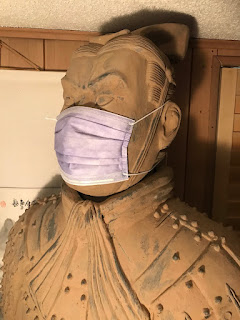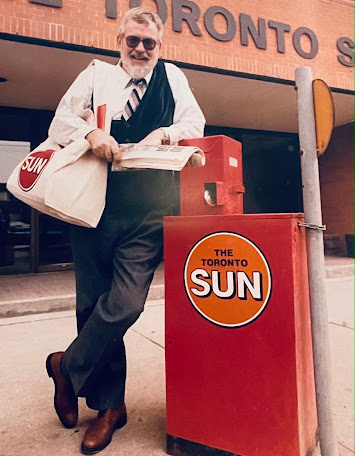THE WEEK THAT WAS
We didn't want to mar the final edition of The Toronto Telegram. After all the glories, innovations and goofs of the newspaper since it began in 1876, we wanted it to enter history as error free as possible in journalism.
So the disintegrating Tely family nitpicked and agonized through the night on October 30, 1971, while nursing headaches of doubts and hopes. It had been a long funeral since John Bassett kept it alive for weeks after he announced the murder because of a Tory leadership convention.
I settled gloomily at the news desk as the first edition flopped in front of me. "THIS IS IT" was the headline, and a big 30, the traditional way for journalists to write the end.
As the Assistant Managing Editor I was lowering the paper into the grave. The only bounce around me was in people not worried about what came next. Such as Clyde Gilmour who telephoned insisting I read his review to him so he could check for mistakes. But then he would start Monday at the Star as one of Canada's leading movie critics who also had a radio show for his records.
The copy boy who scooped the first copies from the Star presses arrived and the daily search of comparisons began. Ray Biggart running the city desk wondered about what we didn't have, mainly the big headline about another pronouncement by Walter Gordon, the Grit guru the Star idolized.
Did we want to scalp the story, the daily copycat exercise as the two giants compared editions?
It didn't task my judgment. The Tely would go into oblivion ignoring the Star's pet. Even though Gordon had a farm outside Schomberg and allowed his neighbour, my brother-in-law Gordon Long, to run a trapline. As the famous economic nationalist, he loved the idea that beaver were trapped there, an echo of the fur business that started the country.
But then there was the time as a young reporter, also working on the census to get enough money to get married, that I asked his wife in their lovely Rosedale home whether the future federal treasurer from the prestigious accounting firm made more annually than the top census figure of $35,000. She said she certainly hoped so. In 1961, that was seven times more than I made.
Biggart didn't argue. He was looking forward to being City Editor on Monday of a different kind of newspaper that was being born out of the mess, the Toronto Sun tabloid. Like many of the 62 Sun "day oners" he went on to an illustrious career as the influential assistant to Paul Godfey, the rookie Metro chairman, (after I turned the job down) and then as Metro parks and property commissioner.
Nothing much happened that day. So I gradually let the staff trickle away. I went into the sound-proofed room, basically a large closet, that housed the many teletype machines that tethered the Tely to the wire services and the world of news and checked for one last time for crashes, sinking and revolts. Nothing! So I turned them off, one by one by one.
Then I went to the composing room and told everyone to go to the wakes. I stood by the "turtle" that held the front page form and ripped up the Telegram name, the metal flag at the top. A sad trophy for my study wall, along with the matte from which the front page was made.
From there to the thunder of the press room. How were they running? The foreman cursed and said the damn things had never run better. I asked what the run call was from circulation and advertising. He said for 328,000 copies. I said people were stopping the delivery trucks and offering dollars for the final copy. How about if we run the presses out of paper? They can't fire both of us because we're ALL gone. Besides he had a job Monday with the Star. So he shrugged, turned the counters off and ran perhaps 345,000 copies before the newsprint storage room was empty.
I returned to an empty newsroom. Alone in silence. I made a sad circuit of all the empty desks and offices, grabbed the big wheel of contact phone numbers from the rewrite desk and carried it and the front-page metal by a startled security guard to a vacant parking lot.
It was a Saturday of anxious farewells for 1,200 Tely employees, many of whom never worked for a newspaper again. But for the 62 gamblers, there was anxious hope up a rickety elevator to the fourth floor of an old building and rudimentary quarters spotted with equipment left behind by a bankrupt company.
I didn't sleep or party. On Sunday I felt like I had the flu as I sat at home at my portable typewriter picking at my first Sun column on the dangers of spending a lot on a new stadium. It didn't help that John Henry and Brett were oblivious and rambunctious and my third son, Mark, was demonstrating that three-month-old babies can be cranky.
Had I chosen wisely for my family when Doug Creighton offered a daily column as the only one covering politics in a small paper? The Star had turned me down when Borden Spears said hiring me would upset their newsroom structure. The Globe hadn't replied. And I had turned down more secure but also probably more boring jobs with the federal fisheries ministry, Toronto Harbour Commission and Etobicoke school board to wade into the unknown.
Creighton greeted me cheerily as I arrived at the strange new home in the afternoon and when I confessed to my Tely mentor about my worries swept me off for lunch in typical style to the Walker House. Nothing like fine food and a few drinks with an old friend to try to make me think this may work out. So I had my first of many grand meals before I even set foot in the Sun, In the future many would say the same as Doug built the paper with his charm.
The "day oners" worked too hard to pay attention to that All Hallow's eve and the trick-or-treaters roaming the dark. There were no resources but experience. But then Monday morning dawned with the sale of all 60,000 copies - except for souvenirs squirreled by "day oners"- leading to the glimmer of success.
I arrived at City Hall to find the Globe had taken over the better Tely office overlooking the Archer sculpture and city property commissioner Harry Rogers (father of Bruce of radio fame) had no intention of giving city space to some unknown little newspaper even if he did know me.
So I descended on Mayor Bill Dennison who had known me since he had started as a trustee when my father, an east-end doctor, had been chairman of the Toronto school board. And Denison ordered Rogers to give me the Globe's old office.
I checked with the office to find that Don Hunt, the third member of the founding triumvirate who looked after promotion, had arranged the first contest. He had hired Bert Petlock, a former Tely police reporter before the PR world, to get a client to donate a big net, tanks of gas and balloons. The idea was to launch the balloons from Nathan Phillips Square. One would have a slip inside awarding an exotic trip from some company that had been conned by Hunt and Creighton into an exchange for future ads.
I found Petlock and limp balloons but no ceremony. So I went back inside and persuaded the mayor to officiate. Petlock inflated the balloons watched carefully by a growing circle of urchins on their battered bikes. The mayor muttered a few words prompted by me. There was no one else there. The mayor tugged the net off but the balloons just rolled around and didn't fly. A few boys didn't wait but rushed in, grabbed a balloon off the ground, and hightailed it for the Sun. No one seemed to know how they knew about the contest or the Sun's strange new address.
I phoned Hunt and we decided to ignore the first boys on the grounds they had cheated. I left him to sort the rest out and walked up University to the Legislature, the first of many such trips since at the start there was no one else covering politics.
Of course the old Tely office there had been captured before I got there. I sat at the big table that dominated the press gallery and appealed to the reporters having the first drink of the day. Since a few sat on the executive of the Toronto Men's Press Club, and I was the future president, I managed to extract a promise of some form of space and a seat in the press galley perched over the Speaker's dais.
It was a hectic day. I walked back to City Hall and managed to stay long enough at a transportation committee meeting to cobble enough for my second column.
The Sun office was organized confusion when I arrived searching for a desk and a typewriter. By the second day Paul Rimstead and I worked out a deal by which we shared an old typewriter and battered desk shoved up against some mysterious and dirty machine. It seemed a suitable arrangement since my column ran across the bottom of Page 4 and he was across the way.
Both Paul and I ached to escape the confusion. He was clutching a package of six assorted mickey-sized liqueurs delivered by one of his many fans and offered me the cherry one if he could write first. He wrote his first take. Then he drank the Creme de menthe while I wrote the start of my column. Then we switched. He composed a second page while I drank. Then we switched. Much was consumed by the time we finished and decided heartily that the Sun may well prosper even if it was in the old Eclipse building. I went to work the next day to find out how my column ended.
And so the Sun began for my 40 years there while 60,000 newspapers grew to more than 300,000 daily and 500,000 on Sunday. We deserved that too since we pioneered Sunday newspapers for the country. Then the little paper that grew shrank along with the entire news trade. My life downtown, my 50 years in journalism, have become memories without structure since the two Tely homes have vanished, and the Sun has moved from the building designed by John Parkin, the architect who worked on City Hall.
And I went from a cub that a prime minister wanted fired to a PM phoning to congratulate me on becoming Editor. Decades of typing and perspiration and inspiration for 6,000 columns and 3,000 editorials. The highs of being quoted even in the House of Lords at Westminster to the lows of libel suits. The peaks of chatting with Netanyahu, arguing with Fidel, lunching with Mandela, and kidding Clinton to the goofs like forgetting the name of the politician I was interviewing on TV.
The Sun's golden anniversary this fall celebrates 50 years even as newspapers die by the thousands. But not my memories!

















